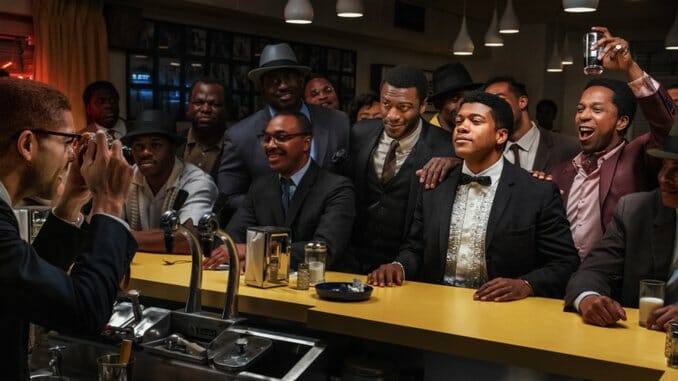With a Movie This Good, Spending One Night in Miami Simply Isn’t Enough
Photos Courtesy of Amazon
A barebones summary of One Night in Miami sounds like a “dude’s delight” movie: Four men out on the town, no attachments to keep them in line and a skyward limit to their evening revelry. But the four men are Sam Cooke, Cassius Clay, Jim Brown and, most of all, Malcolm X; the town is actually the Magic City; and the specific evening is February 25, 1964, when heavyweight boxing champion Sonny Liston crossed gloves with Clay and lost his title in what a plurality of commentators described as an “upset.” Subjects passing the characters’ lips include, of course, boxing, and women and ice cream, but they’re coupled with other, more important subjects like Black American identity, whiteness and how the two interact with one another. But that doesn’t rob One Night in Miami of the “delight” clause, thanks in no small part to crackling performances by a cast of exceptional young actors (Eli Goree, Leslie Odom Jr., Aldis Hodge, Kingsley Ben-Adir), and directed with cool confidence by Regina King in her feature debut behind the camera.
Her adaptation of Kemp Powers’ stage play is a historical document written to presuppose what conversations these fellows might’ve had in private and, save for a pair of Malcolm’s Nation of Islam bodyguards, away from prying ears. It’s a compelling fiction rooted in reality. It’s also thoroughly entertaining, witty and exuberant. This isn’t a film about meaningless merrymaking. It’s about conversations that actually matter, both within the period context and without.
Little that Malcom (Ben-Adir), Brown (Hodge), Cooke (Odom Jr.) and Clay (Goree) confab about has faded into irrelevance in 2021. Their closed door exchanges remain urgent even now, nearly 60 years after Cooke’s and Malcolm’s respective passings and only 5 years after Clay’s. Paranoia hangs over the film like death’s shadow as Malcolm, ever vigilant even on a night meant for celebration, looks over his shoulder to find white men tailing him, loitering by curbs and in parking lots as if it’s a coincidence that they keep happening upon the same places. They never interact face-to-face. They’re not supposed to. In fact, the distance King maintains between these men and Malcolm lands harder than a considerably more dramatized confrontation ever could. It’s one of the two key dampers on the occasion’s joy.
The other damper is Malcolm himself, who at the time of One Night in Miami’s present is wrapped up in a crisis of faith and thus a crisis of identity. His dual existential anxieties coupled with his very grounded, very real anxieties about his and his family’s safety understandably alter his mood further, and the combined strain makes him a tad unpredictable. Malcolm is a verbal pugilist contrasting with Clay, who fights for a living and whose personality is as much a boon to his career as his martial gifts. Between them, Clay’s the bigger braggart but the greater charmer. He’s the beacon the others have come to rally around on this fine night, after all. But Malcolm’s a livewire and it’s he who stirs up tensions among the quartet, particularly concerning Cooke, the brightest star of them all—and yet to Malcolm’s eyes, a kind of disappointment.
-

-

-

-

-

-

-

-

-

-

-

-

-

-

-

-

-

-

-

-

-

-

-

-

-

-

-

-

-

-

-

-

-

-

-

-

-

-

-

-








































